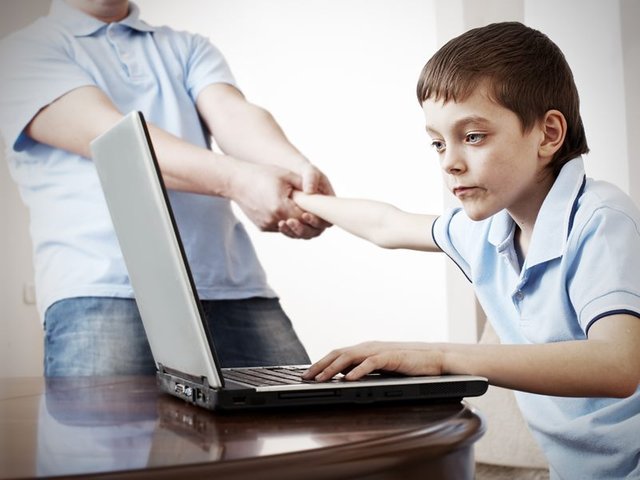TODAY'S CHILDREN DIGITAL NATIVES: WHAT DO THEY LEARN ON THE INTERNET?
TODAY'S CHILDREN DIGITAL NATIVES: WHAT DO THEY LEARN ON THE INTERNET?
FIND OUT WHY DIGITAL NATIVE CHILDREN RISK IN THE CYBER-SPACE. WHAT ACTIVITIES THEY HAVE TO CARRY OUT AND WHAT THEY LEARN IN THEIR DAILY ROUTES ON THE INTERNET.

Hello Steemians! How are you ?, today I want to share about the dangers that children run in their daily trips through cyberspace or the Internet. I will start by locating ourselves in the subject, if you have noticed, it would seem that the children of today, are already programmed for the digital age, because they really learn very fast and without much effort.
It is not uncommon to see children who are facing a computer for the first time and immediately after exploring the computer, they are able to turn on, turn off, identify device inputs, open and close programs and even determine games and play with them, and I am talking about Latino children of school age, of a small community, which is the observable area that I have within my reach, although in tours of some regions, I have observed the same attitude in these children.
They not only have those capabilities, but also know how to download programs, optimize the CPU, explain in their own words how to increase hard drive performance, free or add space to RAM, and all with a technical language included , in addition to knowing and knowing about the types of programs and what they are for, which ones are good and those that are not so good, and make recommendations for their use.
If these children can perform such activities, where are the adults who live with them? They have really remained in the past, relegated to mere passive observers of the development of those skills. With good reason, they rarely allow entry to their world, and that is because they do not speak the same language.
On the other hand, it will seem unusual, but they are also right, when they get bored at school, which is widespread nowadays, since they do not meet their expectations in terms of dynamism and offer them nothing new, as they can not compete with the Internet, social networks and online video games of all kinds badly or well directed, but at the end of the day, attractive and interesting for children.

It does not want to justify with this, that the new generations of "digital natives" as they are called by ... use much of their time learning or "learning wrong" in those activities, but rather, it is a constructive criticism for all adults with children, who have the responsibility to enter, explore and know that digital world or cyberspace, to be able to share and guide it in the best possible way.
The parents in the homes, the teachers in the schools, and everywhere where this youth has networks, games and information online, there must be an adult knowledgeable about the new technologies, that is, they must necessarily become "immigrants". digital ", not to be absorbed by the system, but to face the seduction, to which children are subjected.
It should not be allowed to be conditioned to the most vulnerable population, and then be used as instruments for addiction in any of its forms, violence in all its expressions, alienation and finally madness. Yes ... the madness, as a result of exposure to violent activities that impact your mind for a long time, which is exactly what happens with violent games, where children, young people and even adults abandon themselves in their most basic needs, for meet the challenges to which they are subjected in those games.
It is then, when there are news headlines of children who kill their parents or siblings, young people who massacre entire groups of students in school and adults who violate their wives, husbands or children, as a result of the hallucinations product of the games violent to those who are exposed, that conditions them for this or that action.
Looking for information on the subject, I found many articles that talk about the negative influence of online video games and how they affect children and young people, famous games like League of Legends or World of Warcraft also known as "MMORPG" (role playing game massively multiplayer online), also indicating surprising percentages of users unbalanced psychologically by this and other games on the web.
Specialists such as the psychologist Susana Jiménez responsible for the Pathological Game Unit of the Bellvitge Hospital in Barcelona, the Pediatrician Concepción Ruipérez Cebrián of the Hospital Quirón de Torrevieja, Dr. Javier Goti of the Addictive Behaviors in Adolescents Unit of the Psychiatry and Psychology Service Child and Youth Hospital Clinic of Barcelona, Dr. Tao Ram Director of the Internet Addiction Rehabilitation Center in China, and Dr. Elías Arad Child and Adolescent Psychiatrist of the University of Chile, to mention a few, warn about the causes and consequences of such addictions for that particular population.
To enrich this post and speaking with my own experience, I can tell you that I observed how a 17-year-old adolescent, abandoned his university studies, deteriorated his personality and family relations, by the permanent attachment to the aforementioned game, falling into a depressed state that it almost takes him to the edge of madness, even today keeps him in psychiatric treatment.
I also lived the experience of a friend, whose only 12-year-old son became aggressive, when his mother forbade him to open a combat game that had him obsessed, behaving in the same way that addicts do when he lacks the "drug". ", That attitude was reiterated and constant, to such an extent, that they had to put it with psychological help.

This whole panorama allows us to visualize where our children go, this wonderful generation of digital natives with their enormous potential, but in the not too distant future, they will be dissipated and hidden under the dark mantle of transforming conditioning towards aggressive and violent behavior, antagonistic to the normal course of society.
The idea is to understand the magnitude of the situation that children and young people are facing. It is necessary to generate awareness and a state of reflection, in all those to whom this situation is worrisome. What is exposed in this post goes without encouragement to generate controversy and its purpose is to motivate to assume a critical and responsible attitude towards children, giving priority to discernment and the formation of values in all its positive scales.
This is all. Thanks for reading my post.